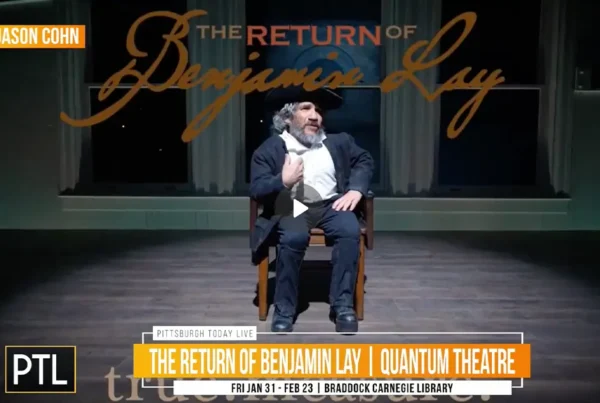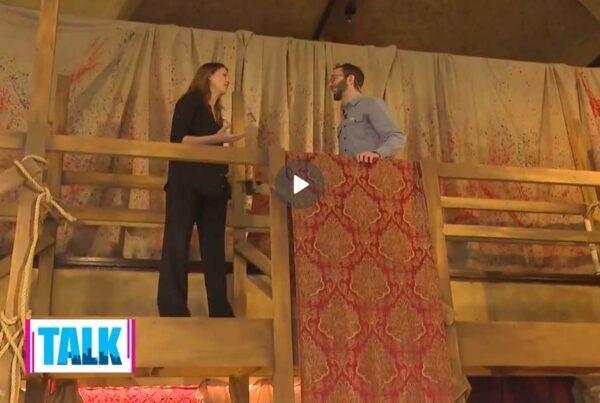Pittsburgh Post-Gazette – It took a few conversations, the right play and 23 tons of dirt to cement a collaboration between Karla Boos and Anne Hamburger, kindred spirits in the creation of site-specific theater.
The dirt actually came a bit later, as the first production of “Red Hills” began to take shape in “a colossal space with no walls,” as Quantum Theatre’s Boos describes the Strip District site. The play will move to New York next, and Ms. Hamburger said her theater can only hope to come close to a space so large and close to Downtown.
“I have never done a co-production of a site-specific piece before, so this is a first for me,” said Ms. Hamburger, the head of En Garde Arts and former Disney VP in charge of the development and production of stage shows for the parks.
Ms. Boos had long admired Ms. Hamburger’s work when they were introduced by mutual pal Gab Cody in Pittsburgh last year. Ms. Hamburger was here when the Pittsburgh Cultural Trust presented En Garde Arts’ “Basetrack Live,” a multimedia theatrical piece about the impact of war on veterans and their families was a top 10 New York Times pick in 2014.
“Red Hills,” by Sean Christopher Lewis, is about a man named David (Scott Parkinson) who writes a book about his time as a 16-year-old missionary in Uganda, when he followed his girlfriend into the woods to help a Rwandan boy and came face to face with a real-life horror story: In 100 days in 1994, Rwanda’s Hutu ethnic majority slaughtered 800,000 members of the Tutsi minority.
On the 20th anniversary of the genocide, David receives a note from a man named God’s Blessing (Patrick J. Ssenjovu) — the Rwandan boy he met as a teenager — that calls him out about the lies in the book. The two reunite and may prove to be each other’s redemption as they grapple with the past and try to forge a path to forgiveness.
The physical path includes junked cars amid tons of sports-safe dirt — the kind you might see at Heinz Field — provided by S&S Processing of Lawrence County.
It is a choice that is part of this collaboration of Pittsburgh and New York minds. The cast, director Katie Pearl and scenic designer Deb O are from New York. Quantum has brought onboard designers Joe Seamans (projections), C. Todd Brown (lighting) and Steve Shapiro (sound), along with a receptive audience for this world premiere.
Ms. Boos loves a challenge, and she knows Quantum theatergoers are always up for one, too.
“When I read the play, I felt new theatrical language that is a mystery to me, and I wanted to explore it,” she says. “That’s the point of departure every single time. And then the collaboration itself, the co-production is putting us into this new territory. I feel super open. Even though it’s often scary, I’m loving what these people from a different world are bringing into our world.”
Finding and re-inventing the space at Smallman and 32nd streets has been no small feat, and, “I feel our contribution is large and significant in this very challenging site,” Ms. Boos says. “And with our audience, the Pittsburgh audience, willing to be the guinea pigs of the experiment, so much will be learned. I am so proud that I can offer this super-adventurous audience.”
Part of the adventure for the collaborators has been the reinvention of a script. The playwright wanted to work with Ms. Hamburger and sent her his one-man show, “Dogs of Rwanda.”
“I read it and called him back and said, ‘If you’re willing to adapt your play to a two-person show, change the name and do it site-specifically, I’m in.’ And he said, ‘OK,’” Ms. Hamburger recalls.
“It’s been a wonderful process for him and for us. I felt the relationships between this black man and this white man, and their grappling with their past relationship and learning to understand one another was so powerful and so moving, and is so timely,” she says.
The subject matter struck Ms. Hamburger as lending itself to nontraditional staging because of “the emotional and intellectual journey of these two characters.” The shared vision requires a large space because the piece begins with the audience making a choice in a highly visual environment, “so it would really feel like an event, with the design elements as part of the overall experience.”
“Red Hills” is a departure for En Garde Arts and Ms. Hamburger in that it involves two actors and is not in the “documentary” theater style of “Backtrack Live” or “Wilderness,” a 2016 multimedia piece about six families facing “the extraordinary pressures and complexities that accompany coming of age in 21st-century America,” exploring issues of mental health, addiction, and gender and sexual identity. “Wilderness” will next play the Kennedy Center in Washington, D.C., Oct. 12-15 (Pharmacy).
“Red Hills” fits into En Garde Arts’ mission in its tone and production qualities.
“I always try to make work that is wonderful as an artistic statement and thought-provoking as social commentary, and combining those two things,” Ms. Hamburger says. “I hope audiences would walk away thinking, ‘That was a stunning show … and it really made me think in a different way about how I interpreted history and about how I think about forgiveness’ “
As Quantum gets ready to deliver the first production of “Red Hills” and En Garde Arts continues its search for a similar New York space, Ms. Hamburger has developed an appreciation for our city’s site-specific assets.
“I love Pittsburgh,” she says. “It reminds me of the best of New York in the ’70s and ’80s. It feels like there’s such a sense of history wherever you go, and so many fascinating, magical buildings. It seems like the possibilities of site-specific work there are endless.”
While Ms. Hamburger is now looking at how “Red Hills” will fit into New York, Ms. Boos is looking at how it will work in Pittsburgh and beyond.
“Maybe it will have a life after New York. Anne likes to tour things,” the Quantum leader says. “I hope she does, because the actors are so beautiful. The process to build this new piece of writing has been so excellent, I think it is going to be a contribution out in the world.”




